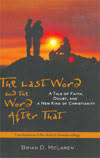 On my trip to Manila, I finished Brian McClaren's A New Kind of Christian trilogy, with the last book being The Last Word and the Word After That. I liked this book best of all. (However, the first book, A New Kind of Christian, was the book that first helped me get somewhat of a grasp on postmodernism and how huge this shift is.)
On my trip to Manila, I finished Brian McClaren's A New Kind of Christian trilogy, with the last book being The Last Word and the Word After That. I liked this book best of all. (However, the first book, A New Kind of Christian, was the book that first helped me get somewhat of a grasp on postmodernism and how huge this shift is.)In this book McClaren has three basic points. I'll try to summarize them briefly and then talk about the most controversial one.
1. Most of the conversation in the book is about hell. How can a good and loving God send finite creatures to enternal, conscious torment? McClaren doesn't give an outright answer. Instead, he is content to shoot down the traditional answer(s) and to suggest possible alternatives. It seems as though he advocates, overall, a position of humble agnosticism tempered by grace. Basically, we don't really know because the Bible isn't entirely clear, and in the end we have to trust in God's mercy and grace as well as in his justice.
2. As the main character embarks on this study of hell-ology, he discovers that learning and knowing happen best in community. McClaren advocates again and again the importance of a community that we "know with." In many respects the people at www.emergentnazarenes.blogspot.com serve as some of the people I "know with."
3. We are saved by grace and judged by works. Since this is (by far) his most controversial statement, let me quote a section from the voice of one of his mentoring characters:
So I'm not denying salvation by grace, no, no, not at all. It's all by grace. I'm just advocating judgment by works ...
Salvation by grace, judgement by works. There's nothing in the Bible clearer than those two realities. Of course, you have to define salvation in Jesus' way, not just modern Western Chrsitianty's [way]. ...
You thought that if you are saved, you are not judged, right? Yep, I used to think that too. I didn't realize that being judged isn't the same as being condemned and that being saved means a lot more than not being judged. For a lot of lok, salvation still means little more than escaping from the legal consequences of having original sin on your passport. For them, until you have your passport changed, which is what being saved means, you can't get through customs in heaven and you're stuck going to hell. But remember - conventional Western Christianity is the religion of the empire. It developed at a time when the church and the empire were joined at the hip, if not the heart. A lot of us didn't get too good of a deal from Imperial Christianity. [The character speaking here is a black pastor.] I guess you could say some of us have seceded from Imperial Christianity, the theology of the empire. When you secede from the theology of the empire, your understandings of salvation and judgment can change for the better. ...
Try reading through your New Testament and looking for the word judged or judgement. You'll see it as clear as day: we're judged by our works. But that's not in contradiction to being saved by grace - if you define salvation in a broader way.
This line of reasoning strikes me as intuitively true. The Bible says again that we will be judged according to the deeds we did in our bodies whether good or bad. We just read that yesterday from 2 Corinthians 5. I've had a hard time reconciling Jesus' parables which mostly imply judgment by works with Paul's discussions of being "saved by grace" and even with Paul's comments of being judged by works.
I'm still pretty sure I don't get all of this. It's hard for me as a Protestant, having grown up with the manifesto of "saved by grace through faith and not by works," to wrap my head around a different idea of salvation and judgment and works and grace. (Maybe this is part of what people refer to when they say "post-Protestant.")
However, this seems true to me, and it seems like it is a missing puzzle piece to make sense of the various pieces of the New Testament which have always seemed in tension to me. I'm still trying to figure this out, but I wanted to share with you an idea that is shaking up my theological world, possibly shaking me into a more Biblical theology. I look forward to your comments.
No comments:
Post a Comment